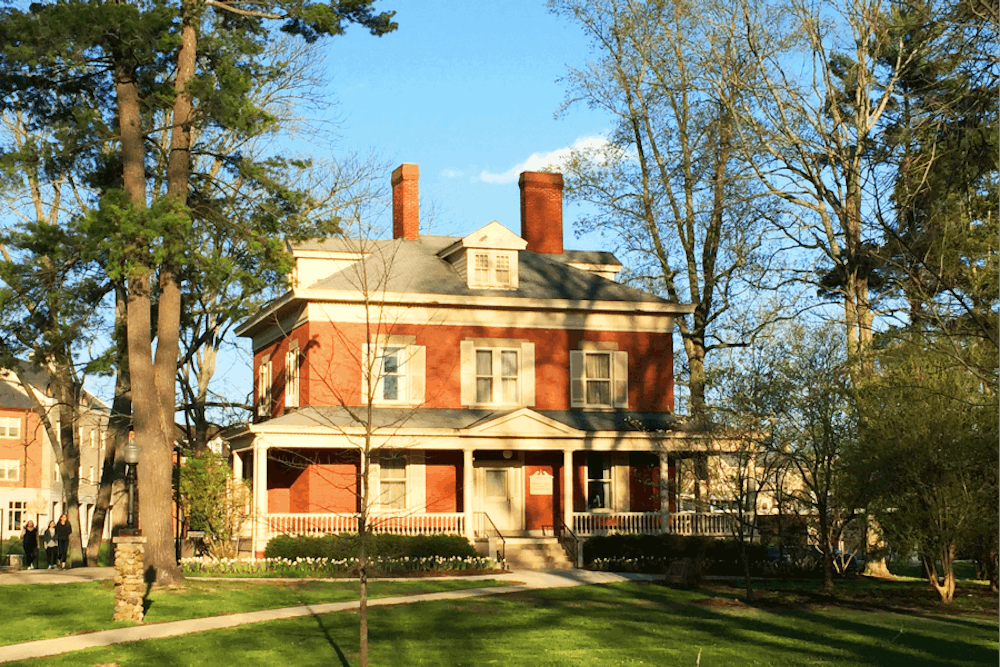By Krista Savage and Maddie Wood, For The Miami Student
After an outpouring of dissent, President David Hodge announced yesterday the university will abandon plans to build a new residence hall on the site of historic Patterson Place.
At their latest meeting Friday, the Board of Trustees reached a unanimous decision to construct Patterson Place Hall, in response to the growing needs of the university.
However, around 4 p.m. yesterday, Hodge announced that, following overwhelming feedback from community members objecting the demolition, Miami will instead search for an alternative location to build.
"It just didn't feel right," Hodge said. "We felt an obligation before we started to really look at it holistically and balance all those things together to make a decision."
According to a memo sent to faculty, Hodge said construction on this site would seriously undermine Miami's sense of pride, self, place and community.
"There's a level of intimacy in the community that's important, and a respect for traditions," Hodge said. "I would like to believe that this is the kind of thinking we try to do always - balancing what makes Miami special with what we need to move forward."
According to Claire Wagner, director for University News and Communications, the Board of Trustees had only approved a preliminary estimate, and not the concrete plans, so it was an easy turnaround for Miami to cancel the demolition of Patterson Place.
"Many people spoke out at the Trustee meeting or contacted Hodge directly," Wagner said. "This is why we decided that Patterson Place had far too much of a rich history for our campus and we are going to respect it."
Former professor Susan Kay was one of four people to voice their opinions at Friday's trustee meeting.
"In my 42 years in Oxford and Miami, I have never seen the morale of faculty or staff any lower than I have seen it now," Kay said.
Among the advocates for the conservation of Patterson Place, many were planning a human-chain protest for 5 p.m. Friday, May 8.
Enjoy what you're reading?
Signup for our newsletter
In light of recent news to salvage Patterson Place, the event has now become a celebration of its restoration. Melanie Ziegler, 1973 alumna and Miami professor since 1986, was planning to lead the protest.
"I have always supported change at Miami. I never came up against something I wanted to protest. But it was different with Patterson Place," Ziegler said. "It's just been a huge part of our lives, the last real part of Western College and such a lush corner of campus."
Many students were joining with community members, faculty and staff to take a stand against the demolition. One was sophomore Maddie LePlante-Dub.
"When I first heard about this demolition, I was actually disappointed that it was even considered. It is proof that Miami is becoming much more business-oriented," said LaPlante-Dube. "But now, a lot of my faith is restored in Miami."
Although the demolition is canceled, the need for a new residence hall has not disappeared.
Miami's current Housing Master Plan states the need for 7,100 beds on the Oxford campus by fall 2017, but a recent update to the plan indicates that 8,000 beds would better fit the incoming student classes.
Despite the recent renovations to East Quad and the three new residence halls on Western Campus, construction of another residence hall has been requested, with university officials claiming it is essential.
Patterson Place was chosen, in part, because of its location. The spot opens easy access to Western Dining Commons as well as the Geothermal Energy Plant.
Several locations around campus are now being considered for a new residence hall. Hodge said one of the best potential options for the location of the new dorm is Withrow Court.
In the faculty memo, Hodge addressed the issues that would arise with finding a new location, such as additional costs. Affordability is something the university has to consider when planning for a new residence hall.
"The challenges that we face in the near term, while significant, we'll figure out how to deal with that," Hodge said. "We need to think about what, in the long run, is going to best."




